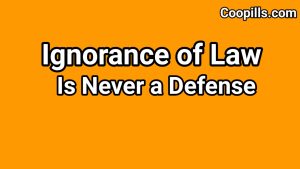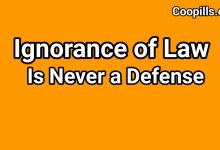Ignorance of law is not a defence
CAN THE ORDINARY GHANAIAN PLEAD IGNORANCE OF LAW?
By: Benjamin Tachie Antiedu, Private Legal Practitioner &
Author
Goodnuff Appiah Larbi, Legal Researcher
Introduction
Law is one of the social institutions that binds all citizens; both young and old. This is because from cradle to grave, man is governed by laws. That is to say that the law
r egulates the entirety of man’s existence, activities, properties and general conduct throughout his lifetime and beyond. This observation aligns with the lucid thought of Antiedu which he shared at the launch of his law book titled Reading the Law. The author noted that: “We’re born into the law; we live within the law and we die according to the law.”
egulates the entirety of man’s existence, activities, properties and general conduct throughout his lifetime and beyond. This observation aligns with the lucid thought of Antiedu which he shared at the launch of his law book titled Reading the Law. The author noted that: “We’re born into the law; we live within the law and we die according to the law.”
The fact of the indispensability and iniquitousness of law in our lives requires every member of society of sound mind and legal age to have full knowledge of the laws of the country and to obey all the laws. Thus, a person of legal age and sound mind who fails to access the law and to know its contents cannot be availed by his or her ignorance of the law if found to be in conflict with the law.
This is because ignorance of the law is no defence in law.
The rule that ignorance of the law is no defence gained considerable currency during the trial, conviction and incarceration of Rosemond Brown a.k.a. Akuapem Poloo in April 2021. She was charged for publishing obscene material and engaging in domestic violence against her son. The actress made a striking remark after her successful bail application pending appeal and release from jail. She said: “I didn’t know that taking a photograph with my son in that manner would put me in trouble.”
The purpose of this article is to inquire into the question of whether or not an ordinary Ghanaian can plead ignorance of law if found to be in conflict with the criminal laws of Ghana.
Table of Contents
Rule of ignorance of law is no defence
Ignorance of law means a lack of knowledge of the law. The rule is that everyone is fixed with knowledge of the law and liable to be punished for disobeying the laws of the country. Hale (1680) explained the rule more lucidly in the following words: “Ignorance of the municipal law of the Kingdom, or the penalty thereby inflicted upon offenders, both not excuse any, that is of the age of discretion and compos mentis, from the penalty of the breach of it; because every person of the age of discretion and compos mentis is bound to know the law, and presumed so to do: [ignorantia juris non-excusat].
The rule depends on the general proposition that ignorance of things that everyone is bound to know shall not excuse anyone. For this reason, a person who fails to know the law and acts in breach of the law is punished as if he knew of the law. Thus, the law takes the position that since the consequences of conduct are obvious to anyone, a person who disobeys the law must be fixed with knowledge of such consequences.
The rule that ignorance of law is no defence is reflected in our Ghanaian criminal jurisprudence, and finds expression in Section 29(2) of the Criminal Offences Act, 1960 (Act 29). This provision stipulates as follows:
“A person shall not be exempt from liability to punishment for any activity on the ground of ignorance that the act is
prohibited by law.”
Thus, in Ghana, all persons (including ordinary Ghanaians) are presumed to know the laws of the country and are bound to comply with them, and those who disobey the law will be liable to punishment as if they knew the law.
Accordingly, the law would not accept a plea of a defence that is founded on the premise that he lacked knowledge of the law so breached.
Rationale behind the rule of ignorance of the law is no defence
The rationale for this maxim is that, if ignorance of the law is accepted as an excuse, any person charged with a criminal offence or sued in a civil action would claim that he or she was unaware of the law in question just to avoid the liability attached to that breach. It is furthered
feared that even the highly educated when caught up in breach of the law would plead ignorance of the law to avoid legal liability. The effect would be that no one would obey by just pleading that he or she did not know the law.
To avoid this kind of situation and to achieve the ends of the law, there is a general imputation of law that all persons who are subject to a law know the law and would be held to account whenever there is a default in compliance.
Mistake of fact distinguished
Ghana’s Criminal Law distinguishes between ignorance of law and mistake of fact. Thus, in Ghana, while ignorance
of the law is not a defence to a criminal conduct, mistake of fact is a complete legal defence. Mistake of fact arises
in a situation where the accused person acted in honest belief that what he did was a lawful activity. This defence is justified on the ground that a person who acts in honest belief of lawfulness of his actions lacks the guilty mind (mens rea) required to establish a criminal offence.
Mistake of fact as a legal defence is expressed in Section 29(1) of Act 29 as follows:
“A person shall not be punished for any act which, because of ignorance or mistake of fact in good faith, he believes to
be lawful.”
An authoritative decision of the Supreme Court on the subject is the case of Nyameneba & Others v The State.
The facts were that the Appellants were members of a religious sect and had been growing and using a certain kind of plants they called “herbs of life” for about four
years. They used the herbs publicly for invocation at their place of worship, for food and medicinal purposes. Upon report to the Police against the activities of the sect, the Police investigated and found the herbs to be Indian hemp. At the trial Court, the accused person pleaded ignorance of fact as their defence. They maintained that they did not know at all that the herbs were Indian hemp but their plea was rejected and convicted. They appealed successfully to the Supreme Court, which found that the Appellants were honestly ignorant of the fact that the herbs they had used for about four years were Indian hemp and as such, a plea of mistake of fact under Section 29(1) of Act 29 ought to avail them. The Supreme Court, speaking through Ollennu JSC, also affirmed that ignorance of the law is no defence but a mistake of fact is a complete defence.
Implications of the rule that ignorance of the law is no excuse
This rule implies that all members of society have unfettered access to the laws of the country and also have the capacity to understand them. While this rule may
be unquestionably applied in jurisdictions that afford citizens with ready access to the laws and their comprehension, the same cannot be said in jurisdictions that lack these provisions such as ours. The strict enforcement of the rule in our jurisdiction would cause a manifest injustice if we prosecute and punish persons who lack both ready access to the laws and comprehension of their contents.
The ordinary Ghanaian falls into this category of persons who lack both ready access to the laws of Ghana and knowledge of their contents.
On the basis of the above concern, the question is often asked whether the ordinary Ghanaian can plead ignorance
of the law when he comes into conflict with the law to escape liability. It is argued that it would be pointless to punish a person for breaking a law that he knows not of its existence or contents.
The Ordinary Ghanaian and the Law
The rule that ignorance of the law is no excuse is predicated on the presumption that the people have full knowledge of the laws of the land or that they have unfettered access to the laws but they have refused to acquaint themselves with the laws. As earlier alluded to, this cannot be said to reflect the state of affairs in Ghana.
Despite the giant gains made in educating our people, there remains a majority of the illiterate population including the ordinary Ghanaian. They rely solely on discussions on the law by the media principally television and FM stations which are not adequately done given their time limitations and their capacity to convey full legal knowledge. This accounts largely for the high level of legal illiteracy in the country. Sadly, through no fault of theirs, they are required to comply with a law they are oblivious of and cannot even be heard to plead that they did not know the law or its existence at the time they come into conflict with the same.
The writers have identified three categories of Ghanaians who have little or no knowledge of the laws of Ghana and their contents. The first group comprises illiterates, who presumed not to know the laws of Ghana as well as their contents, and the 2010 Population and Housing Census puts their percentage at 27.5 per cent (drawn from Ghana’s literacy rate of 71.5 per cent). The second group of Ghanaians are made up of the percentage of Ghanaians who are literate but have no reasonable access to the laws of Ghana. The third group consists of literate Ghanaians who have reasonable access to the laws of Ghana but who do not read these laws.
Access to law remains is a big problem. Lawyers and other educated members of our society continue to battle with lack of immediate access to new legislations passed by Parliament. The situation is worsened by the fact that we fail to incorporate amendment laws into their parent legislations.
Conclusion and recommendations
While endorsing the purpose of the rule to ensure that the law works to achieve its objects, the writers also recognise the fact that the strict application of the rule
would occasion a manifest injustice against ordinary ghanaians who may be punished for a crime they knew nothing about.
The writers, therefore, strongly recommend for the establishment of system that would ensure that there is a continuous public legal education to address the knowledge gap and also make the law more accessible to the citizenry. This system, which would be led by the National Commission on Civic Education (NCCE), should take advantage of the opportunities offered by information and communication technology including social media platforms for the education of the public and for making the making the laws more accessible to the people. This system would promote obedience to law, protect innocent citizens from breaking laws unknown to them, create a peaceful country and enhance the welfare of the people of Ghana.
REFERENCES
Antiedu, B. T.: 2019: Reading the Law (Pentecost Printing Press Limited, Accra).
Brobbey S.A.: 2011: Practice &; Procedure in Trial Courts and Tribunals (Advance Legal Publication, Accra).
The 2010 Population and Housing Census (Statistical Service of Ghana).
Criminal Offences Act, 1960 (Act 29).
Rollin M. Perkins: 1939: (Journal) Ignorance and Mistake in Criminal Law.
The Republic v Rosemond Brown @ Akuapem Poloo (Unreported 2021), Circuit Court.
Nyameneba & Ors v The State [1965] GLR 723-729.


